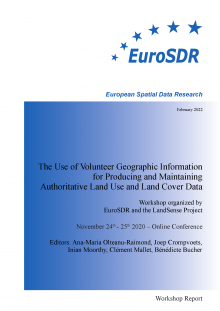Workshop report - VGI4LULC (2021)
The report refers to the workshop that was organized on behalf of EuroSDR and the LandSense project (24-25 November 2020). LandSense aims to build a citizen observatory for Land Use and Land Cover (LULC) monitoring by proposing innovate technologies for data collection, change detection, data quality assessment and offering tools and systems to empower different communities (e.g., private companies, Non Governmental Organisation, National Mapping Agencies, research, public authorities) to monitor and report on LULC. The workshop was co-organized by the LASTIG laboratory of the University Gustave Eiffel and IGN-ENSG, the French National Mapping agency (Ana-Maria Olteanu-Raimond, Clément Mallet, Bénédicte Bucher), the Katholieke Universiteit Leuven (Joep Crompvoets), the International Institute for Applied Systems Analysis (Inian Moorthy) and EuroSDR.
LULC data are necessary for different applications (e.g., urbanization growth, biodiversity conservation, climate change) in monitoring our environment at national, regional and local scales. Different European initiatives such as CORINE Land Cover, Copernicus, Urban Atlas allow the production of LULC data in vector format (i.e. feature-based LULC). The National Mapping Agencies (NMAs) also produce feature based LULC data at regional or national scales based on demand and available resources.
The feature-based LULC data are generally cyclically produced every 3 to 6 years, which is not always adequate. Moreover, producing LULC data is costly and a lack of in-situ information can generate incompleteness or inaccuracies. Recent research shows that LULC databases may take advantage of the use of Volunteer Geographic Information (VGI) to produce or improve update LULC data. For example, different approaches allowing to derive LULC data from OpenStreetMap are proposed. In this context the objective of the workshop was to bring together different actors (e.g., National mapping agencies, academic communities, private companies) having experiences in featurebased LULC data production or change detection in order to 1) dress an exhaustive list of the current practices and issues in mapping feature-based LULC data and 2) share innovative approaches allowing to produce, monitor and update LULC data.

